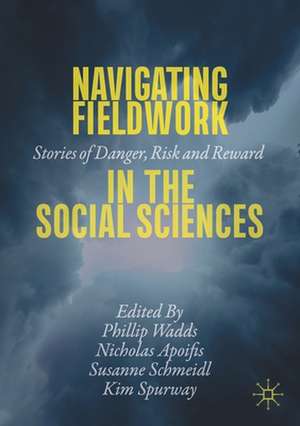Navigating Fieldwork in the Social Sciences: Stories of Danger, Risk and Reward
Editat de Phillip Wadds, Nicholas Apoifis, Susanne Schmeidl, Kim Spurwayen Limba Engleză Paperback – 15 sep 2020
This edited collection of first-person stories about risk in the field offers an arsenal of practical examples where fieldworkers have attempted to negotiate the complexities and risks of field research. Field research can be a risky and dangerous journey where the line between safety and danger can be crossed in quick time, often with little warning. These risks manifest in diverse and novel ways. They can be physical and psychological, ephemeral and enduring. They can impact the researchers, participants, collaborators and interviewees. Indeed, they can condition the very foundation of our processes of knowledge production. Fieldwork is no small stakes game. Covering research from Afghanistan, Chad, DR Congo, Greece, the Horn of Africa, Iraq, Laos, Lebanon, Palestine, India, Indonesia, Mexico, The Netherlands, Vietnam and Australia, each chapter highlights diverse, eclectic, raw and vulnerable narratives about risks experienced before, during and after the conduct of this research. This book is of great value to inexperienced and experienced fieldworkers alike.
Preț: 199.76 lei
Nou
Puncte Express: 300
Preț estimativ în valută:
38.23€ • 39.15$ • 31.80£
38.23€ • 39.15$ • 31.80£
Carte disponibilă
Livrare economică 25 februarie-11 martie
Livrare express 08-14 februarie pentru 24.14 lei
Preluare comenzi: 021 569.72.76
Specificații
ISBN-13: 9783030468545
ISBN-10: 3030468542
Pagini: 210
Ilustrații: XVIII, 223 p.
Dimensiuni: 148 x 210 x 16 mm
Greutate: 0.32 kg
Ediția:1st ed. 2020
Editura: Springer International Publishing
Colecția Palgrave Macmillan
Locul publicării:Cham, Switzerland
ISBN-10: 3030468542
Pagini: 210
Ilustrații: XVIII, 223 p.
Dimensiuni: 148 x 210 x 16 mm
Greutate: 0.32 kg
Ediția:1st ed. 2020
Editura: Springer International Publishing
Colecția Palgrave Macmillan
Locul publicării:Cham, Switzerland
Cuprins
1. Introduction: Collecting Stories, Nicholas Apoifis, Phillip Wadds, Susanne Schmeidl & Kim Spurway.- 2. Sex In The Academy/Sex In The Field: Bodies Of Ethics In Activist Research, Zahra Zsuzsanna Stardust.- 3. Sitting With The Mess, Caroline Lenette.- 4. Fear And Loathing In The Cross: Researching The Policing Of Nightlife In Sydney, Phillip Wadds.- 5. Doing Critical Drugs Research: From Deconstructing To Encountering Risk, George Dertadian.- 6. ‘I Hope Little Worms Die In Your Arse’: Fieldwork, Anarchists, Fascists, And Academic Snitches, Nick Apoifis.- 7. Doing Elite Interviews In Feminist Research: Confessions Of A Born-Again Observationist, Louise Chappell.- 8. Risking The Self: Vulnerability And Its Uses In Research, Tanya Jakimow.- Enter The Dragon: Coming Of Age As Blond, White, Female Researcher In Fragile Contexts, Susanne Schmeidl.- 10. ‘If You Want To Know About Evil, Ask The Devil’: Research In Post-Conflict Countries, Kim Spurway.- 11. Conclusion: Sharing Stories, Kim Spurway.
Recenzii
“Navigating Fieldwork in the Social Sciences is one of the most honest and courageous books on fieldwork I have read. … More than a must-read for field researchers, I hope these contributions beget more honesty and courage from similarly situated scholars, and in this way ease the sufferings and help in the struggle toward egalitarian knowledge production.” (Chester Antonino C. Arcilla, IQAS, International Quarterly for Asian Studies, Vol. 53 (4), 2022)
Notă biografică
Phillip Wadds is Senior Lecturer in Criminology at the University of New South Wales, Sydney, Australia. He has spent the last decade undertaking ethnographic and field-based research examining various features of nightlife in Sydney with an enduring focus on its policing and regulation.
Nicholas Apoifis is Senior Lecturer in Politics and International Relations at the University of New South Wales, Sydney, Australia. His 2017 manuscript Anarchy in Athens (Manchester University Press), was based on unprecedented access to one of the world’s most militant anarchist movements and involved Militant Ethnography.
Susanne Schmeidl is Senior Lecturer in Global Development at the University of New South Wales, Sydney, Australia. She is a scholar practitioner with field experience in Afghanistan. Her research focuses on understanding drivers of conflict and forced migration as well as grassroots peace efforts.
Kim Spurway is a Senior Research Associate at the Institute for Culture and Society at Western Sydney University. She has worked on five national surveys commissioned by the United Nations on the socio-economic impact of landmines and unexploded ordinance on post-conflict countries.
Textul de pe ultima copertă
This edited collection of first-person stories about risk in the field offers an arsenal of practical examples where fieldworkers have attempted to negotiate the complexities and risks of field research. Field research can be a risky and dangerous journey where the line between safety and danger can be crossed in quick time, often with little warning. These risks manifest in diverse and novel ways. They can be physical and psychological, ephemeral and enduring. They can impact the researchers, participants, collaborators and interviewees. Indeed, they can condition the very foundation of our processes of knowledge production. Fieldwork is no small stakes game. Covering research from Afghanistan, Chad, DR Congo, Greece, the Horn of Africa, Iraq, Laos, Lebanon, Palestine, India, Indonesia, Mexico, The Netherlands, Vietnam and Australia, each chapter highlights diverse, eclectic, raw and vulnerable narratives about risks experienced before, during and after the conduct of this research. This book is of great value to inexperienced and experienced fieldworkers alike.
Caracteristici
Offers powerful, raw and candid first-hand stories of conducting dangerous, risky and rewarding research around the globe from fieldworkers across the social sciences Provides insights into doing research in post-conflict settings, researching controversial or taboo topics, and researching vulnerable people Considers the moral risks, hazards and challenges that fieldworkers may face Discusses successes and failures in mitigating risk before, during and after the field experience
